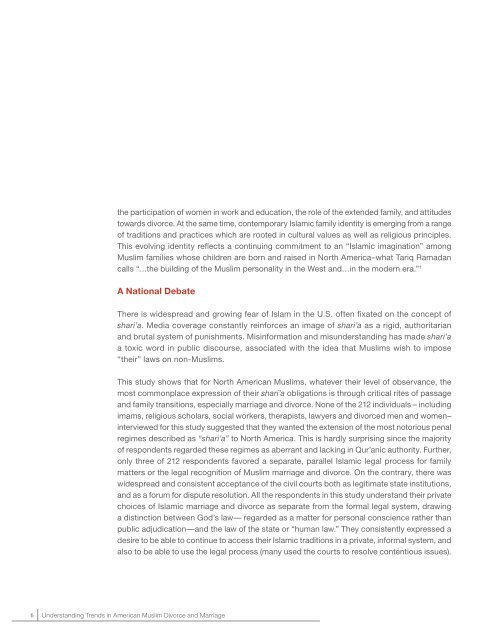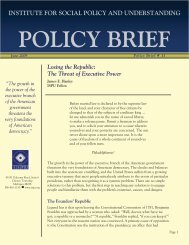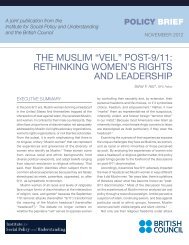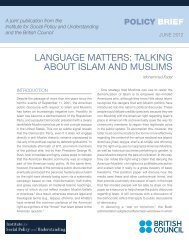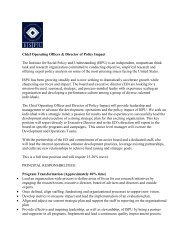Understanding trends in american mUslim divorce and marriage:
Understanding trends in american mUslim divorce and marriage:
Understanding trends in american mUslim divorce and marriage:
You also want an ePaper? Increase the reach of your titles
YUMPU automatically turns print PDFs into web optimized ePapers that Google loves.
the participation of women <strong>in</strong> work <strong>and</strong> education, the role of the extended family, <strong>and</strong> attitudes<br />
towards <strong>divorce</strong>. At the same time, contemporary Islamic family identity is emerg<strong>in</strong>g from a range<br />
of traditions <strong>and</strong> practices which are rooted <strong>in</strong> cultural values as well as religious pr<strong>in</strong>ciples.<br />
This evolv<strong>in</strong>g identity reflects a cont<strong>in</strong>u<strong>in</strong>g commitment to an “Islamic imag<strong>in</strong>ation” among<br />
Muslim families whose children are born <strong>and</strong> raised <strong>in</strong> North America–what Tariq Ramadan<br />
calls “…the build<strong>in</strong>g of the Muslim personality <strong>in</strong> the West <strong>and</strong>…<strong>in</strong> the modern era.” 1<br />
A National Debate<br />
There is widespread <strong>and</strong> grow<strong>in</strong>g fear of Islam <strong>in</strong> the U.S. often fixated on the concept of<br />
shari’a. Media coverage constantly re<strong>in</strong>forces an image of shari’a as a rigid, authoritarian<br />
<strong>and</strong> brutal system of punishments. Mis<strong>in</strong>formation <strong>and</strong> misunderst<strong>and</strong><strong>in</strong>g has made shari’a<br />
a toxic word <strong>in</strong> public discourse, associated with the idea that Muslims wish to impose<br />
“their” laws on non-Muslims.<br />
This study shows that for North American Muslims, whatever their level of observance, the<br />
most commonplace expression of their shari’a obligations is through critical rites of passage<br />
<strong>and</strong> family transitions, especially <strong>marriage</strong> <strong>and</strong> <strong>divorce</strong>. None of the 212 <strong>in</strong>dividuals – <strong>in</strong>clud<strong>in</strong>g<br />
imams, religious scholars, social workers, therapists, lawyers <strong>and</strong> <strong>divorce</strong>d men <strong>and</strong> women–<br />
<strong>in</strong>terviewed for this study suggested that they wanted the extension of the most notorious penal<br />
regimes described as “shari’a” to North America. This is hardly surpris<strong>in</strong>g s<strong>in</strong>ce the majority<br />
of respondents regarded these regimes as aberrant <strong>and</strong> lack<strong>in</strong>g <strong>in</strong> Qur’anic authority. Further,<br />
only three of 212 respondents favored a separate, parallel Islamic legal process for family<br />
matters or the legal recognition of Muslim <strong>marriage</strong> <strong>and</strong> <strong>divorce</strong>. On the contrary, there was<br />
widespread <strong>and</strong> consistent acceptance of the civil courts both as legitimate state <strong>in</strong>stitutions,<br />
<strong>and</strong> as a forum for dispute resolution. All the respondents <strong>in</strong> this study underst<strong>and</strong> their private<br />
choices of Islamic <strong>marriage</strong> <strong>and</strong> <strong>divorce</strong> as separate from the formal legal system, draw<strong>in</strong>g<br />
a dist<strong>in</strong>ction between God’s law— regarded as a matter for personal conscience rather than<br />
public adjudication—<strong>and</strong> the law of the state or “human law.” They consistently expressed a<br />
desire to be able to cont<strong>in</strong>ue to access their Islamic traditions <strong>in</strong> a private, <strong>in</strong>formal system, <strong>and</strong><br />
also to be able to use the legal process (many used the courts to resolve contentious issues).<br />
6<br />
<strong>Underst<strong>and</strong><strong>in</strong>g</strong> Trends <strong>in</strong> American Muslim Divorce <strong>and</strong> Marriage


